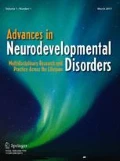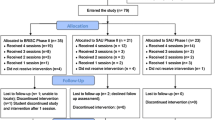Abstract
Objectives
The current study analyzed the data from a 1-year pragmatic clinical trial on the effectiveness of a naturalistic implementation of the PEAK Relational Training System in a public school setting.
Methods
We accessed student records from two classrooms at the same grade level within one public school. Students’ assignments in these two classrooms were based on the severity of their diagnosis. Students in both classrooms received conventional special education services and applied behavior analysis intervention based on the PEAK Relational Training System. Post hoc analyses were conducted after one school year to compare students’ behavior skill levels, school readiness skills, and their relationship with their daily dosage of ABA intervention.
Results
Post hoc analyses indicated a significant difference in students’ behavior skill level and school readiness skills at the beginning of the school year. Significant differences were also found in the amount of PEAK interventions delivered to each classroom. At the end of the school year, all students demonstrated improvements on the PEAK pre-assessment (p < .001) and the Bracken School Readiness Assessment (BSRA; p < .001). A secondary analysis examined variables that predicted students’ progress and showed that their daily ABA dosage (R2 = .278) was a significant predictor of their BSRA improvement.
Conclusions
The current study added to a growing body of research demonstrating the utility and feasibility of implementing PEAK-based interventions in special education settings. Behavior interventions along with special education practices produced significant outcomes on students’ overall skill level and school readiness. Implications of applying a low dosage of ABA intervention are discussed.


Similar content being viewed by others
Data Availability
The data that support the findings of this study are available from the first author, Z. Y., upon reasonable request.
References
Barron, B. F., Paliliunas, D., & Dixon, M. R. (2021). Evaluation of the PEAK-DT and PEAK-G pre-assessments: Comparing directly implemented and indirect assessments of verbal abilities. Journal of Behavioral Education, 30, 604-623. https://doi.org/10.1007/s10864-019-09362-5
Belisle, J., Clark, L., Welch, K., McDonald, N., Dennis, L., & Sickman, E. (2022). Evaluation of broad skill repertoire changes over 3 months of PEAK implementation in a special education classroom. Behavior Analysis in Practice, 15(1), 324–329. https://doi.org/10.1007/s40617-021-00657-6
Belisle, J., Paliliunas, D., & Dixon, M. R. (2021). Emergent entailed analogical reasoning of “same,” “different,” and “opposite” in children with disabilities. Journal of Behavioral Education, 1-12. https://doi.org/10.1007/s10864-021-09438-1
Bracken, B. A. (2007). Bracken School Readiness Assessment (3rd Ed.0. The Psychological Corporation.
Dixon, M. R., Belisle, J., McKeel, A., Whiting, S., Speelman, R., Daar, J. H., & Rowsey, K. (2017). An internal and critical review of the PEAK Relational Training System for children with autism and related intellectual disabilities: 2014–2017. The Behavior Analyst, 40(2), 493–521. https://doi.org/10.1007/s40614-017-0119-4
Dixon, M. R., Stanley, C., Belisle, J., Galliford, M. E., Alholail, A., & Schmick, A. M. (2017). Establishing derived equivalence relations of basic geography skills in children with autism. The Analysis of Verbal Behavior, 33(2), 290–295. https://doi.org/10.1007/s40616-017-0084-8
Dixon, M. R., Belisle, J., Stanley, C. R., & Rowsey, K. (2018a). Student outcomes after 1 year of front line staff implementation of the PEAK curriculum. Behavioral Interventions, 33(2), 185–195. https://doi.org/10.1002/bin.1516
Dixon, M. R., Wiggins, S. H., & Belisle, J. (2018b). The effectiveness of the PEAK relational training system and corresponding changes on the VB-MAPP for young adults with autism. Journal of Applied Behavior Analysis, 51(2), 321–334. https://doi.org/10.1002/jaba.448
Dixon, M. R., Paliliunas, D., Barron, B. F., Schmick, A. M., & Stanley, C. R. (2021). Randomized controlled trial evaluation of ABA content on IQ gains in children with autism. Journal of Behavioral Education. https://doi.org/10.1007/s10864-019-09344-7
Dixon, M. R., & Stanley, C. R. (2020). PEAK relational training system. In F. R. Volkmar (Ed.), Encyclopedia of autism spectrum disorders. Springer. https://doi.org/10.1007/978-1-4614-6435-8_102280-1
Dixon, M. R., Yi, Z., & Chastain, A. N. (2022). PEAK relational training system. In J. B. Leaf, J. H. Cihon, J. L. Ferguson, & M. J. Weiss (Eds.), Handbook of applied behavior analysis interventions for autism: Integrating research into practice, 341–360. Springer International Publishing. https://doi.org/10.1007/978-3-030-96478-8_18
Dixon, M. R. (2014a). PEAK relational training system: Direct training module. Shawnee Scientific Press.
Dixon, M. R. (2014b). PEAK relational training system: Generalization module. Shawnee Scientific Press.
Dixon, M. R. (2019). PEAK comprehensive assessment. Shawnee Scientific Press.
Emergent Press. (2018a). PEAK Relational Training System Direct Training Module Pre-assessment script and stimuli. Emergent Press. https://www.peak2aba.com/free-clinical-resources. Accessed 20 June 2022.
Emergent Press.(2018b). PEAK Relational Training System Generalization Module Pre-assessment script and stimuli. Emergent Press. https://www.peak2aba.com/free-clinical-resources. Accessed 20 June 2022.
Graziano, P. A., Slavec, J., Hart, K., Garcia, A., & Pelham, W. E. (2014). Improving school readiness in preschoolers with behavior problems: Results from a summer treatment program. Journal of Psychopathology and Behavioral Assessment, 36(4), 555–569. https://doi.org/10.1007/s10862-014-9418-1
Hedges, S. H., Kirby, A. V., Sreckovic, M. A., Kucharczyk, S., Hume, K., & Pace, S. (2014). “Falling through the cracks”: Challenges for high school students with autism spectrum disorder. The High School Journal, 98(1), 64–82. https://doi.org/10.1353/hsj.2014.0014
Keen, D., Webster, A., & Ridley, G. (2016). How well are children with autism spectrum disorder doing academically at school? An Overview of the Literature. Autism, 20(3), 276–294. https://doi.org/10.1177/1362361315580962
Keller, F. S. (1968). Good-bye teacher…. Journal of Applied Behavior Analysis, 1(1), 79–89. https://doi.org/10.1901/jaba.1968.1-79
Lindsay, S., Proulx, M., Thomson, N., & Scott, H. (2013). Educators’ challenges of including children with autism spectrum disorder in mainstream classrooms. International Journal of Disability, Development and Education, 60(4), 347–362. https://doi.org/10.1080/1034912X.2013.846470
Loudon, K., Treweek, S., Sullivan, F., Donnan, P., Thorpe, K. E., & Zwarenstein, M. (2015). The PRECIS-2 tool: Designing trials that are fit for purpose. British Medical Journal, 350. https://doi.org/10.1136/bmj.h2147
Moore, J. L., Yi, Z., Hinman, J. M., Barron, B. F., & Dixon, M. R. (2020). Examining the convergent validity between the PEAK Relational Training System’s semi-standardized and standardized skill assessments. Journal of Developmental and Physical Disabilities. https://doi.org/10.1007/s10882-020-09771-9
Odom, S. L., Boyd, B. A., Hall, L. J., & Hume, K. (2010). Evaluation of comprehensive treatment models for individuals with autism spectrum disorders. Journal of Autism and Developmental Disorders, 40(4), 425–436. https://doi.org/10.1007/s10803-009-0825-1
Panter, J. E., & Bracken, B. A. (2009). Validity of the Bracken School Readiness Assessment for predicting first grade readiness. Psychology in the Schools, 46(5), 397–409. https://doi.org/10.1002/pits.20385
Sutton, A., Pikula, A., Yi, Z., & Dixon, M. R. (2021). Evaluating the convergent validity of the PEAK Comprehensive Assessment (PCA): Intelligence, behavior challenges, and autism symptom severity. Journal of Developmental and Physical Disabilities. https://doi.org/10.1007/s10882-021-09814-9
Williams, H. C., Burden-Teh, E., & Nunn, A. J. (2015). What is a pragmatic clinical trial? Journal of Investigative Dermatology, 135(6), 1–3. https://doi.org/10.1038/jid.2015.134
Author information
Authors and Affiliations
Contributions
Z. Y. helped develop the methods of the study, conducted data analysis, and wrote parts of the paper. J. K. curated data and conducted research. M. R. D. developed the methods of the study, collaborated in the writing, and editing of the final manuscript.
Corresponding author
Ethics declarations
Ethics Approval
Ethical approval was waived by the Human Subjects Committee of the Southern Illinois University Carbondale in view of the retrospective nature of the study and all the procedures being performed were part of the routine care. Study data was generated and de-identified data set was provided to the first and third author when they were both affiliated with the Southern Illinois University Carbondale.
Informed Consent
Written consent was obtained from school officials to access de-identified student data.
Conflict of Interest
Mark R. Dixon receives small royalties from sales of the PEAK. The remaining authors declare no conflict of interest.
Additional information
Publisher's Note
Springer Nature remains neutral with regard to jurisdictional claims in published maps and institutional affiliations.
Rights and permissions
Springer Nature or its licensor (e.g. a society or other partner) holds exclusive rights to this article under a publishing agreement with the author(s) or other rightsholder(s); author self-archiving of the accepted manuscript version of this article is solely governed by the terms of such publishing agreement and applicable law.
About this article
Cite this article
Yi, Z., Koenig, J. & Dixon, M.R. Comparing Low Dosages of ABA Treatment on Children’s Treatment Gains and School Readiness. Adv Neurodev Disord 7, 222–230 (2023). https://doi.org/10.1007/s41252-022-00296-0
Accepted:
Published:
Issue Date:
DOI: https://doi.org/10.1007/s41252-022-00296-0




